Key takeaways:
- Character weaknesses, such as procrastination and fear of public speaking, can hinder personal and professional growth, but recognizing them is a crucial first step.
- Effective strategies to overcome weaknesses include setting specific goals, seeking accountability, and practicing self-compassion.
- Engagement in personal development resources, like self-help books and online courses, can significantly enhance self-awareness and growth.
- Maintaining progress over time involves tracking achievements, revisiting goals, and seeking mentorship for ongoing motivation and guidance.

Understanding character weaknesses
Character weaknesses are often those traits that create hurdles in our personal and professional lives. I recall a time when my tendency to procrastinate nearly derailed a project I was passionate about. How often do we find ourselves putting off tasks, only to realize that this pattern not only stresses us out but also impacts our relationships?
Recognizing these weaknesses requires a level of self-awareness that many of us struggle to achieve. I remember feeling a wave of frustration when I acknowledged my fear of public speaking; it was as if a mirror reflected not only my apprehensions but also the missed opportunities that came with them. Have you ever reflected on what holds you back, only to be surprised by the depth of your own struggles?
Understanding our character weaknesses is not just about identifying flaws; it’s an invitation to growth. I’ve found that accepting these aspects of myself often leads to powerful transformation. What if embracing vulnerability could be the key to unlocking our true potential?
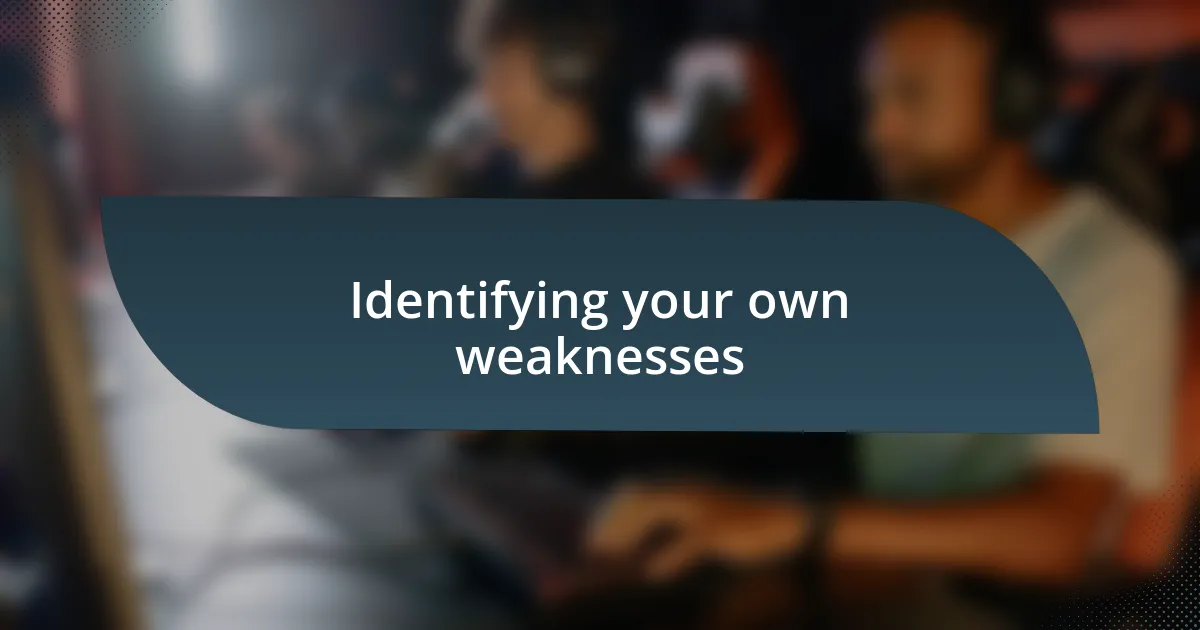
Identifying your own weaknesses
Identifying your weaknesses starts with honest reflection. I once took a week to journal my daily experiences, focusing on my reactions and feelings. Surprisingly, the patterns that emerged were illuminating; I noticed how my impatience often led to hasty decisions, which would backfire. This process helped me pinpoint not just the weaknesses, but also the triggers that exacerbated them.
To make this task easier, you might consider the following approaches:
- Ask for feedback from trusted friends or colleagues; sometimes others see things we miss.
- Keep a journal of situations where you felt stressed or unconfident.
- Reflect on past mistakes and analyze what you could have done differently.
- Take personality assessments; these can provide insights into your traits and challenges.
- Set aside time for quiet contemplation—from this stillness can emerge clarity.
Each of these methods has the potential to guide you toward a deeper understanding of yourself. They not only help identify your weaknesses but also encourage a greater sense of openness to change.
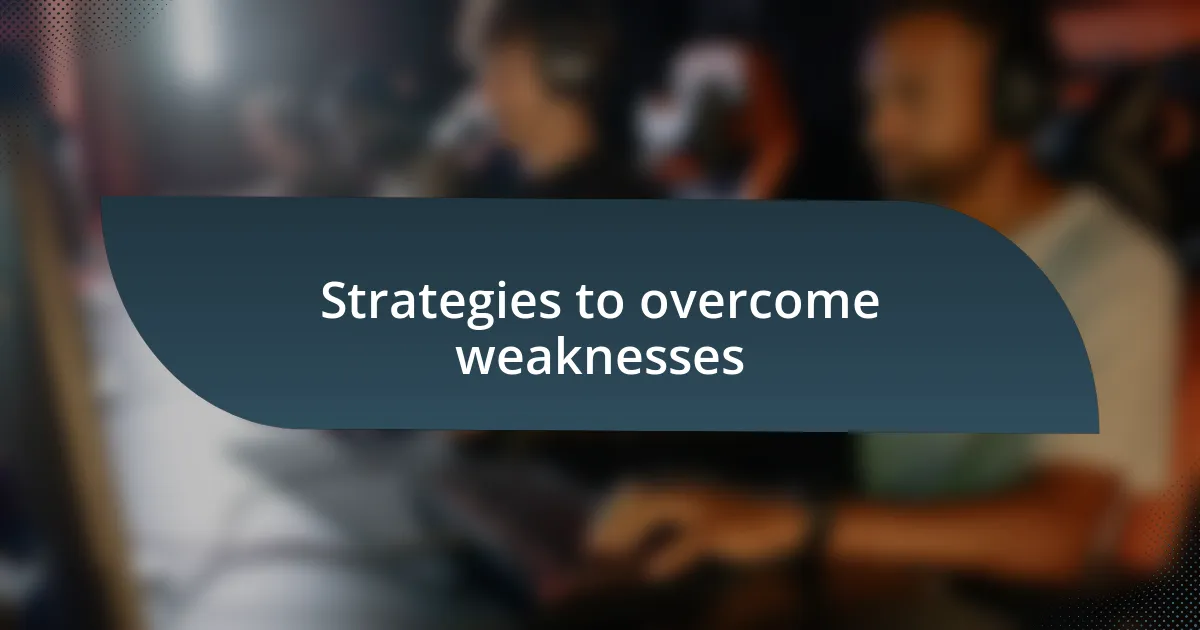
Strategies to overcome weaknesses
To overcome weaknesses, I’ve found that setting specific, achievable goals can make a significant difference. For instance, when I recognized my struggle with procrastination, I started breaking tasks into smaller, manageable steps. This not only made the tasks feel less daunting but also created a sense of accomplishment as I ticked items off my list.
Another effective strategy is to seek accountability. I remember enlisting a close friend to check in on my progress every week, which really pushed me to stay focused. Having someone else involved added an element of motivation and commitment that I otherwise struggled to maintain on my own.
Finally, practicing self-compassion plays a vital role in navigating weaknesses. Rather than beating myself up over setbacks, I learned to acknowledge my efforts and view mistakes as opportunities for growth. This shift in mindset helped me approach my weaknesses with patience and understanding, rather than frustration.
| Strategy | Description |
|---|---|
| Set Specific Goals | Break down larger tasks into smaller, achievable steps to avoid feeling overwhelmed. |
| Seek Accountability | Involve a friend or mentor to hold you accountable for your progress, adding motivation to stay on track. |
| Practice Self-Compassion | Acknowledge your efforts and view mistakes as learning opportunities to foster a positive mindset. |
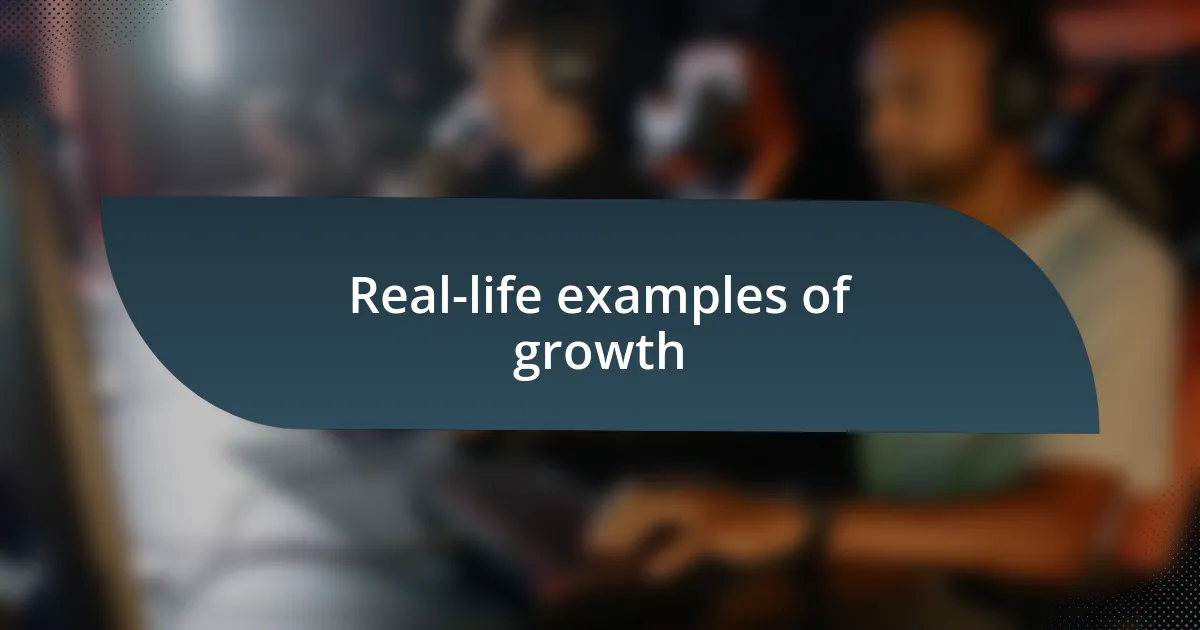
Real-life examples of growth
Reflecting on my journey, I recall the time I decided to tackle my fear of public speaking. Initially, I would feel my heart race at the thought of presenting in front of a group, but I knew I had to confront this weakness head-on. I started by participating in small group discussions and gradually built up to larger audiences. Each successful experience boosted my confidence, and I couldn’t help but wonder how many opportunities I had missed before.
I also experienced significant growth when I worked on my tendency to avoid difficult conversations. There was a particular instance where I needed to address a conflict with a colleague. Instead of shying away, I prepared for the conversation, focusing on being clear and respectful. It felt challenging, but afterward, I felt a weight lifted off my shoulders. Isn’t it interesting how facing our fears can lead to newfound strength?
Lastly, I remember my struggle with consistency in maintaining a healthy lifestyle. As I began setting realistic fitness goals, I surprised myself with the progress I made over time. I went from sporadic workouts to finding joy in daily movement. Sometimes I think back to how far I’ve come and realize that growth isn’t always linear; it’s about embracing the journey, complete with its ups and downs.
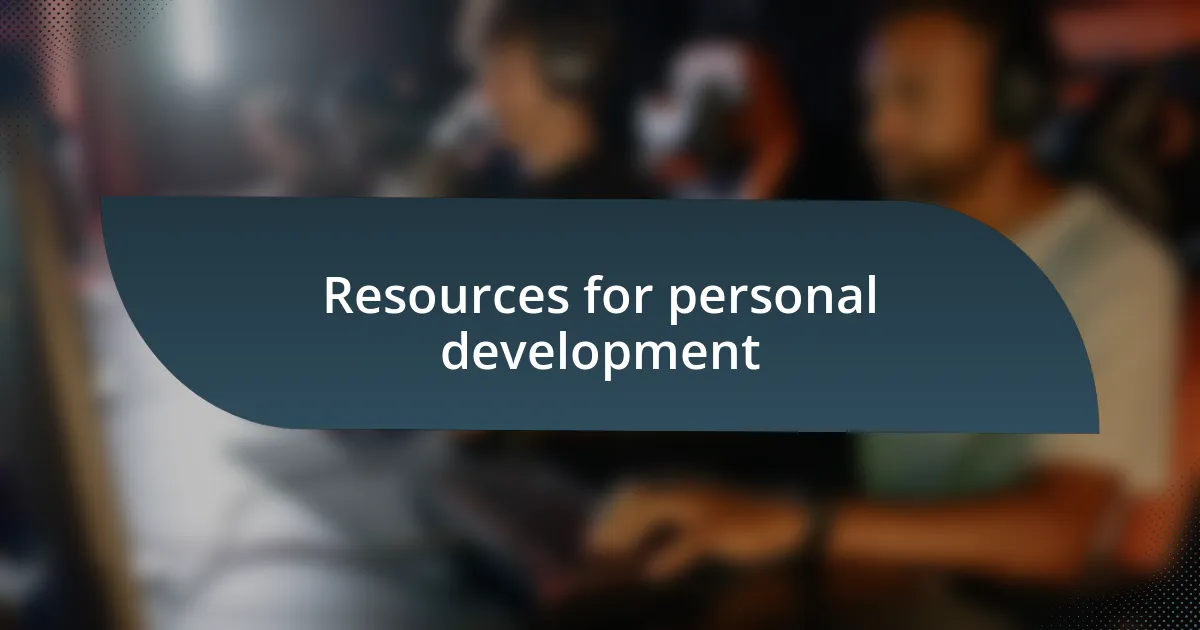
Resources for personal development
Seeking out resources for personal development can truly shape your growth journey. I remember diving into self-help books that resonated with my struggles. One that stood out was about emotional intelligence; it opened my eyes to the importance of understanding my feelings and those of others. Have you ever found a book that shifted your perspective so significantly? It’s remarkable how the right words at the right time can empower you to change.
Online courses are another fantastic avenue I explored. I enrolled in a course on effective communication that I stumbled upon during a late-night search for ways to improve my interactions. It was enlightening to learn techniques to convey my thoughts more clearly and confidently. The moment I applied those skills in real-life situations, I felt an exhilarating mix of nerves and excitement—like finally stepping into my true self.
Don’t underestimate the value of a supportive community, either. I involved myself in a local group focused on personal development. Listening to others share their vulnerabilities forged a deep connection, reminding me I wasn’t alone in my struggles. Have you ever felt that liberating sense of camaraderie? It’s that shared experience that can transform our personal growth, creating a safe space where we can learn from one another.
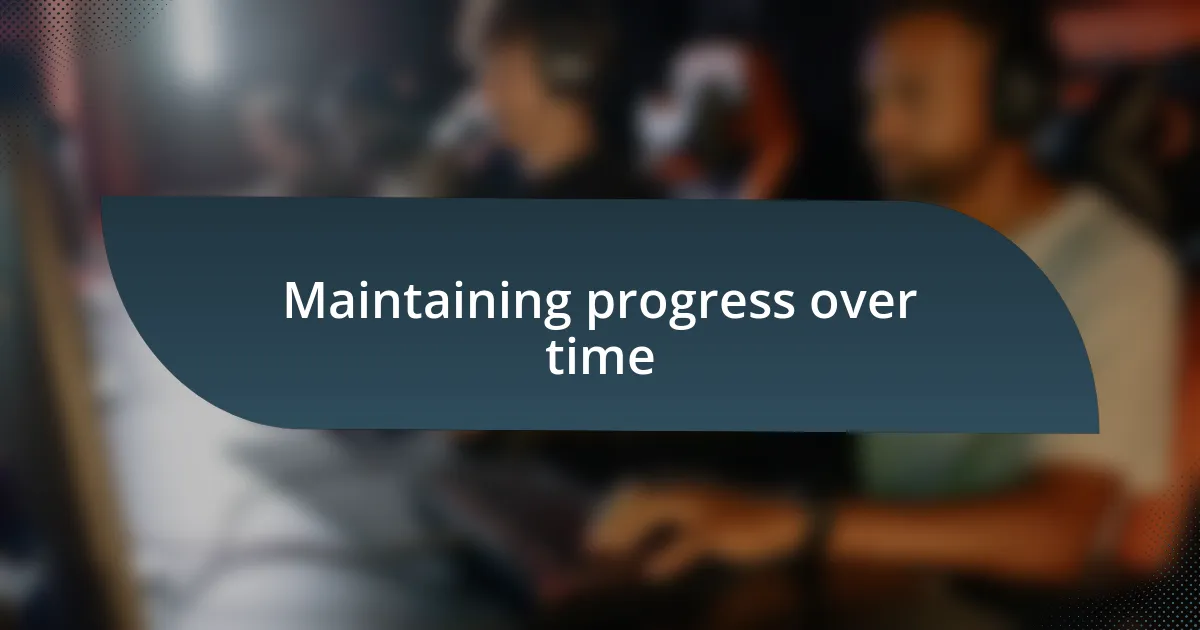
Maintaining progress over time
Progress isn’t just about initial breakthroughs; it’s maintaining those gains over time that truly matters. I recall facing moments when my motivation would wane, especially after a small setback. During those times, I found it helpful to revisit my initial goals and remind myself why I started this journey in the first place. Have you ever had to motivate yourself after a loss? Focusing on my vision reignited my passion.
Another strategy I adopted was tracking my progress through journaling. This simple act of writing down my thoughts and developments created a sense of accountability. I vividly remember flipping back through my entries and realizing how far I had come—those moments felt like stepping stones on a path that was uniquely mine. Don’t you agree that seeing tangible evidence of growth can be incredibly motivating?
Engaging regularly with mentors has also played a crucial role in my sustained growth. I reached out to a mentor who offered me invaluable feedback, especially during challenging phases. Having that outside perspective shifted my view on failures, helping me understand they are just part of the learning curve. How often do we overlook the wisdom of those who have walked a similar path? Their guidance not only solidified my resolve but reminded me that progress is often a marathon, not a sprint.











